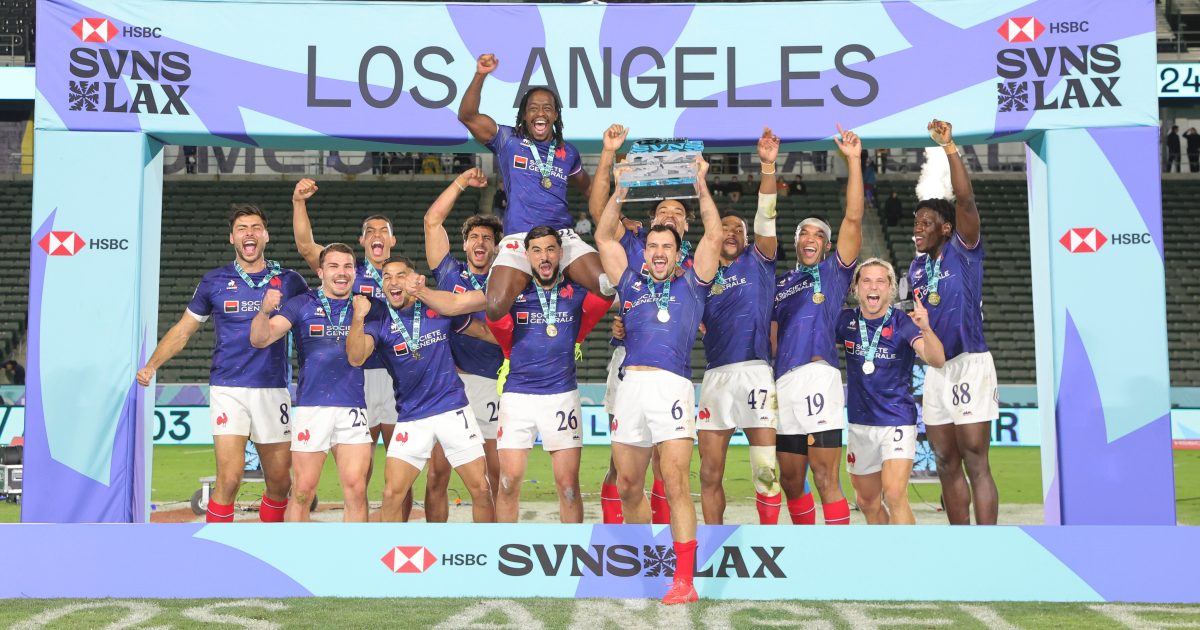France 7 décroche enfin l'or à Los Angeles

La France s’est imposée 21-0 face à une Grande-Bretagne blessée pour remporter sa première médaille d’or sur le circuit mondial de rugby à sept depuis près de 20 ans au HSBC SVNS Los Angeles.
La dernière victoire avait eu lieu à Paris en 2005, et après une longue période de disette, la France a marqué trois essais sans réponse pour enfin graver son nom sur le trophée en verre de Los Angeles.
Antoine Dupont a fait la une des journaux en rejoignant l’équipe à Vancouver la semaine dernière. Et depuis son arrivée, les Français ont remporté le bronze puis l’or, ce qui leur permet de se hisser à la quatrième place du classement des Series.
Dans la finale pour la troisième place, l’Irlande a confortablement battu l’Espagne par 24-7 après avoir mené 19-0 à la pause.
Par ailleurs, la Nouvelle-Zélande s’est inclinée 12-5 face aux Samoa dans le match pour la neuvième place, terminant ainsi à la dixième place, sa plus mauvaise place de la saison.
La France triomphe d’une Grande-Bretagne déterminée
La Grande-Bretagne se montrait mesurée en attaque dans les premiers instants, mais ne parvenait pas à percer la défense française, qui regagnait la possession dans ses propres 22.
La France avançait sur le terrain en phase offensive mais était trop pressée d’ouvrir le score. Un offload risqué tombait au sol et redonnait la possession du ballon à la Grande-Bretagne. Les Bleus ne tardaient pas à marquer le premier essai après que Tom Emery se soit blessé alors qu’il avait le ballon en main, la France reprenant la possession et marquant par Antoine Zeghdar.
Les blessures de la Grande-Bretagne réduisaient son banc à un seul joueur et elle devait combler un retard de sept points en deuxième mi-temps, mais la France n’avait aucune pitié et déployait ses skills pour contourner la défense des Britanniques et marquer son deuxième essai pour prendre une avance de 14-0.
Désespéré en défense, Morgan Williams entravait la tentative de la France de relancer vite après une pénalité et écopait d’un carton jaune. La Grande-Bretagne tentait de contenir les assauts de la France sur sa ligne, mais n’a pas pu éviter d’encaisser un essai Theo Forner sous les poteaux pour porter l’écart à 21.
Une médaille d’argent pour la Grande-Bretagne reste de loin son meilleur résultat de la saison, améliorant sa septième place à Vancouver le week-end dernier et lui permettant de revenir à un point des États-Unis en neuvième position et à la sécurité dans le tableau des Series.
Demi-finale : La France bat l’Irlande et la Grande-Bretagne l’Espagne
La France a tenu bon pour s’imposer 26-24 face à l’Irlande en demi-finale, après une transformation manquée par l’Irlandais Billy Dardis dans les ultimes secondes.
Jordan Conroy avait ouvert le score pour l’Irlande dès la première minute, mais c’est la France qui menait 12-7 à la pause grâce à des essais d’Antoine Dupont et de Rayan Rebbadj, ce dernier marquant sur le coup de la mi-temps.
La France ajoutait un autre essai juste après la pause, Paulin Riva s’échappant pour marquer sous les poteaux, mais l’Irlande réagissait rapidement par l’intermédiaire de Terry Kennedy, qui marquait son 100e essai sur le circuit pour ramener son équipe à un point.
Mais c’est un essai français qui scellera le sort du match : parti de derrière sa ligne d’en-but, Stephen Parez-Edo Martin a fini par botter le ballon et Antoine Zeghdar l’a récupéré pour inscrire le quatrième essai français, synonyme de qualification pour la finale.
De son côté, la Grande-Bretagne a obtenu une pénalité à la dernière minute pour s’imposer 10-7 contre l’Espagne et se qualifier pour la finale.
L’Espagne a bénéficié d’une longue période de possession dans les premières minutes, mais une défense solide a permis à la Grande-Bretagne de repousser les Espagnols énergiques derrière la ligne d’avantage. La Grande-Bretagne s’est montrée beaucoup plus dangereuse en attaque lorsqu’elle a eu le ballon et a ouvert le score par Robbie Fergusson pour les seuls points de la première période.
La Grande-Bretagne a creusé l’écart grâce à Alex Davis, mais un plaquage manqué a suffi à l’Espagne pour passer sous les poteaux par Tobias Sainz-Trapaga et à revenir à trois points. L’Espagne a remporté un turnover pour s’offrir une dernière attaque dans les derniers instants, mais une récupération en faveur de la Grande-Bretagne leur a permis de s’assurer la victoire.
L’Irlande bat l’Espagne et remporte la médaille de bronze
Le doublé de Zac Ward en première période et le troisième essai d’Ed Kelly ont permis à l’Irlande de mener 19-0 à la mi-temps contre l’Espagne. L’essai de Chay Mullins en fin de match a couronné un week-end fort et a assuré la deuxième place de l’Irlande dans le tableau des séries.
L’Espagne avait atteint la première demi-finale de Cup de l’histoire contre la Grande-Bretagne plus tôt dans la journée. Cette quatrième place est la meilleure de la saison jusqu’à présent, après la huitième place obtenue à Perth.
Classement du tournoi de Los Angeles 2024 :
- France
- Grande-Bretagne
- Irlande
- Espagne
- Argentine
- Fidji
- Australie
- Etats-Unis
- Samoa
- Nouvelle-Zélande
- Afrique du Sud
- Canada




















